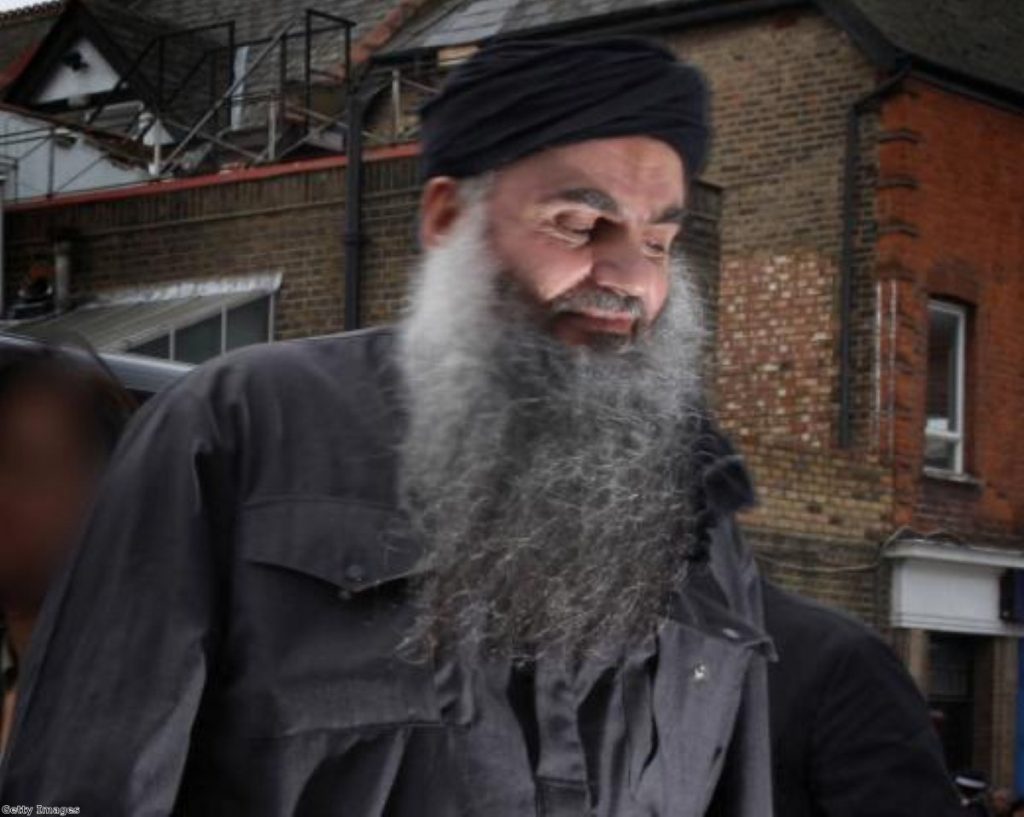Abu Qatada: Judgement shows May never stood a chance
The media will scream and howl once again at the never-ending failure of British home secretaries to deport the gruesome Abu Qatada. Yet, as a close look at today's court judgement shows, Theresa May never looked like succeeding.
The case of Qatada – whose real name is actually Omar Othman – has been rumbling on for a mind-numbingly long time. He was sentenced in absentia to a life of hard labour by a Jordanian court in 1999 for conspiring to carry out a terror attack, before getting another 15 years for a second plot in 2000.
It took the terror attacks of September 11th 2001 for the British authorities to act against him. His decade in and out of prison in Britain began in October 2002 when David Blunkett detained him without trial. Qatada's status has been in question more or less ever since. Today was the latest episode in an attempt to deport him to Jordan originally begun in 2005. It took three years before the court of appeal made its original ruling against sending him to Jordan. There was a substantial risk, the judges explained, that part of the evidence given by co-defendants, Abu Hawsher and Al-Hamasher, had been obtained under torture.
It took the law lords to break the impasse, when in February 2009 they ruled that Qatada could be deported, after all. The breakthrough came after the Lords, then Britain's highest court, found the Jordanian authorities would give him a fair trial. A series of deals the UK had done with Middle Eastern countries ensuring fair treatment for those extradited played a role in convincing them. David Cameron, then leader of the opposition, added his voice to those calling for Qatada to be kicked out of the country. "People who come here and radicalise young men and encourage them to do these dreadful acts – it's just unacceptable and they should be deported," he said.


For all the celebrations, the story was far from over. The case went to the European court of human rights, which trumped the law lords' judgement on the grounds Qatada's right to a fair trial was endangered. That should have been that. But government lawyers have an unparalleled inability to accept defeat. After further discussions between London and Amman, Theresa May made up her mind to refuse to revoke the existing deportation order.
It was that decision which Qatada's lawyers took to the special immigration appeals commission last autumn. The SIAC found in his favour on November 17th last year. Now on the losing side once more, the Home Office's legal eagles opted to appeal.
The judgement in the case, from master of the rolls Lord Dyson, Lord Justice Richards and Lord Justice Elias, was delivered earlier today.
Wading through the text reveals a simple truth: the government's lawyers don't really have a leg to stand on. Much of their firepower is targeted against the SIAC for deciding the Jordanian prosecutor would have to bear a burden of "proving to a high standard" that the dodgy evidence wouldn't be admitted in evidence at a retrial.
"Her fundamental complaint is that SIAC did not take into account or (if it did) it did not place sufficient weight on the fact that the Jordanian court is independent, impartial and, in its quest for a fair trial, would conscientiously take account of the difficulties that Mr Othman would face in seeking to prove that the impugned statements were obtained by torture," the judgement states.
"But SIAC did expressly take into account the fact that the three judges who tried Mr Othman would be independent and impartial and would evaluate the evidence conscientiously."
The judges acknowledged the extraordinarily high level of interest in Qatada's case. They said the "general feeling" that his deportation is "long overdue" is "entirely understandable", before trying to explain why their hands were effectively tied by the limited nature of their role.
"The principles that we have to apply do not distinguish between extremely dangerous persons and others who may not constitute any danger in the United Kingdom and whom the secretary of state wishes to deport to face trial in another country," they add.
"The fact that Mr Othman is considered to be a dangerous terrorist is not relevant to the issues that are raised on this appeal. It would be equally irrelevant if we were deciding the question whether there was a real risk that he would be tortured if he were returned to Jordan."
Ultimately, though, the government's appeal failed on points of law, not on whether these particular judges were coming to a different view on the merits of the case. "Criticisms of this kind of a decision by a specialist tribunal are particularly difficult to sustain," the judgement concluded. "For the reasons that we have given, we are satisfied that SIAC did not commit any legal errors." Even if they disagreed with the decision, their job was to look at the legal points – and nothing else.
All of which leaves us no closer towards getting Qatada deported. The Home Office is taking its appeal to the supreme court – but is probably wasting taxpayers' money in doing so. "This is not the end of the road," a spokesperson declared. That may be – but this is starting to look like a road to nowhere.









